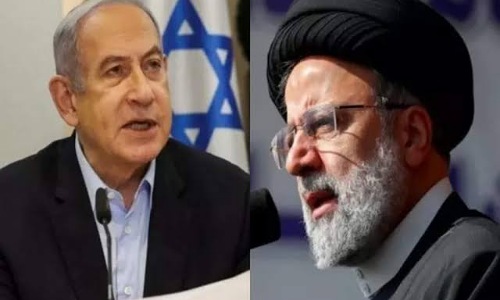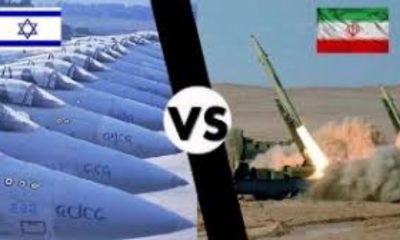International News
Iran Unleashes Over 100 Drones, Missiles On Israel

Iran retaliated against Israel by launching more than 100 drones and missiles in response to an Israeli airstrike on the Iranian consulate in Damascus earlier this month.
According to BBC Middle East correspondent Hugo Bachega, the retaliatory attack resulted in loud explosions, with air defense systems engaging and intercepting objects over the city, illuminating the night sky with multiple interceptions.
Israeli officials had anticipated the attack, with Prime Minister Benjamin Netanyahu stating that the country was prepared for any potential scenarios.
Iran had previously warned of retaliation against Israel for its airstrike on the Iranian consulate in Syria on April 1st, which resulted in the deaths of seven Revolutionary Guards, including two generals, and six Syrians.
While Israel had not claimed responsibility for the Damascus strike, it has acknowledged conducting numerous airstrikes in Syria over recent years targeting Iranian-linked sites.
President Biden reaffirmed unwavering support for Israel, pledging “ironclad” assistance to ensure its security.
The Israel Defense Forces (IDF) confirmed reports of drones launched from Iran towards Israel in a statement.
It said “A short while ago, Iran launched UAVs from within its territory toward Israel. The IDF is on high alert and is constantly monitoring the operational situation.
“The IDF Aerial Defense Array is on high alert, along with IAF fighter jets and Israeli Navy vessels that are on a defense mission in Israeli air and naval space. The IDF is monitoring all targets.
“We ask the public to adhere to and follow the instructions of the Home Front Command and the official IDF announcements regarding the matter.”
In a national address, Israeli Prime Minister Benjamin Netanyahu affirmed that the military is fully prepared for any potential scenario.
He said ” The military is ready for any scenario. Citizens of Israel, in recent years, and especially in recent weeks, Israel has been preparing for a direct attack by Iran.
“Our defensive systems are deployed; we are ready for any scenario, both defensively and offensively. The State of Israel is strong. The IDF is strong. The public is strongstrong.
“We have determined a clear principle: Whoever harms us, we will harm them. We will defend ourselves against any threat and will do so level-headedly and with determination.” he added
Former Israel Defense Forces spokesman Jonathan Conricus highlighted the significance of the current situation, stating that “this is day one of the new Middle East,” emphasizing that Iran is directly attacking Israel from its own territory for the first time.
Speaking on the BBC News Channel, he referenced reports of over 100 Iranian drones and cruise missiles en route to Israel, each with varying expected times of arrival.
Jonathan Conricus noted that Israeli air defenses are actively engaged in intercepting these threats.
When questioned about Israel’s preparedness for such a scenario, he commented, “I think Israel is good at planning military contingencies, but they don’t always excel at the strategic part.”
He added “I didn’t expect the Iranians to do this, from Iranian soil. It will drag other countries, including the US, into the conflict.”
International News
ICC Issues Arrest Warrants For Israeli Prime Minister Netanyahu, Others
The International Criminal Court (ICC) has taken a historic step, issuing arrest warrants for Israeli Prime Minister Benjamin Netanyahu and former Defense Minister Yoav Gallant.
The charges include crimes against humanity and war crimes allegedly committed during Israel’s recent assault on Gaza.
In a detailed statement, the ICC accused the Israeli leaders of “intentionally and knowingly depriving the civilian population in Gaza of objects indispensable to their survival, including food, water, and medicine and medical supplies, as well as fuel and electricity.”
READ MORE: Osun Govt Decries Attempted Murder Of Park Mgt Chairman By Police
The ICC’s move marks a significant escalation in international scrutiny of the Israeli-Palestinian conflict. Netanyahu and Gallant are alleged to have orchestrated policies that caused severe harm to the civilian population in Gaza, leading to widespread condemnation from human rights organizations.
Alongside the charges against Israeli officials, the ICC also issued an arrest warrant for Hamas military commander Mohammed Deif. Deif has long been a central figure in Hamas’s military operations. Israel’s military claims to have killed him in a July airstrike, although this has not been independently verified.
The warrants highlight growing calls for accountability amid the ongoing conflict in the region. The ICC’s actions are likely to provoke heated debate and may complicate diplomatic efforts aimed at resolving the crisis.
With the warrants issued, global attention now turns to how the international community will respond and whether any practical steps will be taken to enforce them.
International News
COP29: Climate Summit Faces Deadlock Over Vague Funding Proposals For Vulnerable Nations
As the 29th United Nations Climate Change Summit (COP29) nears its conclusion, tensions are rising over a newly published funding proposal aimed at assisting developing nations in addressing climate-induced crises.
The proposal, released by the United Nations Framework Convention on Climate Change (UNFCCC) on Thursday, has sparked widespread debate among delegations, activists, and observers at the summit.
The document, spanning ten pages, outlines funding options to support developing countries in implementing their Nationally Determined Contributions (NDCs) under the 2015 Paris Agreement.
READ ALSO: Osun Explains N75,000 New Minimum Wage
However, it fails to specify how much wealthier nations are required to contribute annually—a key sticking point that has drawn criticism from the Global South and climate advocates.
Ambiguity in Funding Commitments
Critics argue that the absence of concrete figures undermines the credibility of the proposed framework.
Mohamed Adow, Founder and Director of Power Shift Africa, described the proposal as “a blank piece of paper,” highlighting the lack of clarity on financial commitments.
“This is the ‘finance COP.’ We came here to talk about money. The way you measure money is with numbers. We need a cheque, but all we have right now is a blank piece of paper,” Adow remarked during an interview.
The Global South, led by African delegations, is demanding at least $1.3 trillion annually by the end of the decade to adapt to climate change impacts and transition to sustainable energy systems.
Yet, developed nations have yet to commit to a specific annual figure, raising concerns over the summit’s ability to deliver tangible outcomes.
Key Provisions and Concerns
The new text acknowledges the disproportionate impact of climate change on developing nations and the financial barriers they face, including high costs of capital and limited fiscal space.
READ ALSO: NNPCL Launches Utapate Crude Oil Blend, Eyes Production Expansion In 2025
It proposes the establishment of a New Collective Quantified Goal (NCQG) for climate finance, suggesting a framework of “at least USD [X] trillion annually” from 2025 to 2035.
However, the absence of defined numbers has led to frustration among negotiators.
David Tong, Global Industry Campaign Manager at Oil Change International, emphasized the critical role of finance in achieving meaningful progress.
“Without finance, there is no phase-out [of fossil fuels], no energy transition, no adaptation. The ambitious options are simply missing,” Tong stated during a press briefing.
Rising Frustration from the Global South
Delegates from the Global South have expressed dissatisfaction with what they perceive as weak commitments from developed nations.
Many fear that without concrete financial pledges, the summit’s outcomes may fall short of expectations.
“This summit is about delivering justice to those who suffer most from climate impacts. Wealthy nations must step up and provide the necessary funding,” said an African negotiator, speaking on condition of anonymity.
A Critical Juncture
With less than 48 hours remaining in the summit, the stakes are high. The COP29 negotiations in Baku, dubbed the “finance COP,” are expected to set a precedent for addressing the financial needs of vulnerable nations.
Delegates are calling on world leaders to finalize an ambitious NCQG target and bridge the growing divide between developed and developing nations.
International News
Biden Approves Anti-Personnel Mines For Ukraine
In a significant policy move, U.S. President Joe Biden has authorised the transfer of anti-personnel mines to Ukraine, signaling heightened support for the country amid its ongoing struggle against Russian forces.
The decision underscores the administration’s commitment to bolstering Ukraine’s defensive capabilities as the conflict shows no signs of abating.
This announcement follows reports that Ukrainian forces have employed U.S.-supplied ATACMS missiles to conduct precision strikes within Russian territory.
These developments have reportedly prompted Russian President Vladimir Putin to modify elements of Russia’s nuclear doctrine, further intensifying global scrutiny of the conflict’s escalation.
READ MORE: Vinicius Jr. Honors Cameroonian Roots Ahead Of Brazil’s Clash With Uruguay
In addition to the mines, the U.S. is set to unveil a new $275 million military aid package for Ukraine in the coming days. The package is expected to include a range of munitions and equipment aimed at enhancing Ukraine’s operational readiness.
This move aligns with Washington’s broader strategy to maintain robust support for Kyiv, even as questions loom over potential shifts in U.S. foreign policy with the approaching transition to a new administration.
The U.S. government has remained steadfast in its support for Ukraine, with officials emphasizing that these measures are essential for helping Ukraine defend its sovereignty. The provision of anti-personnel mines, however, marks a controversial step, reflecting the urgency of the situation on the ground.
As the conflict continues, the Biden administration’s decisions will likely have profound implications not only for Ukraine but also for the broader geopolitical landscape, where tensions remain high and outcomes uncertain.













